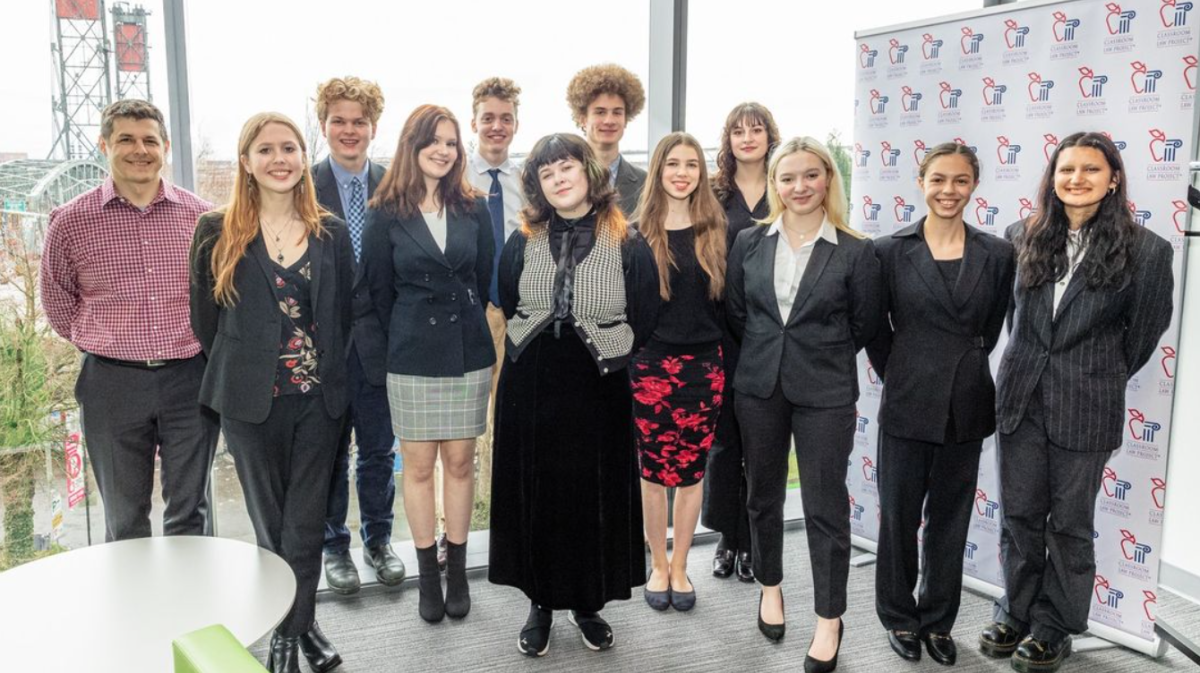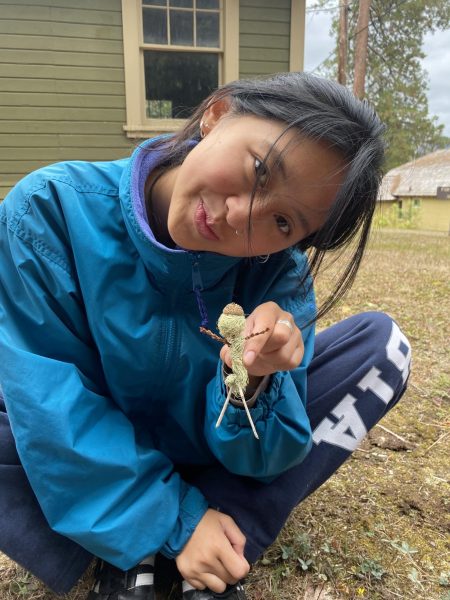The Franklin Law program has revitalized, with social studies teacher Brian Halberg spearheading the efforts. Halberg is easy to come by, being well known as Franklin’s resident law expert and a coveted Advanced Placement (AP) World History teacher. His governance of this program has been incredibly successful. The law program is built of three sects: mock trial, constitutional law, and speech and debate; all have high levels of participation and are garnering lots of success.
Mock trial is a program that gives students an understanding of the justice system in our country and provides an opportunity for them to participate in fictional trials. Students learn and improve their evidence gathering, critical thinking, and public speaking skills. For those who are unfamiliar, mock trial goes exactly as it sounds. First, students divide into teams to learn and study the details of a case. Next, the trial is played out exactly as it would be in real court: attorneys, witnesses, plaintiffs, and all. Hazel Allen is a junior at Franklin who competed on the varsity Maroon team last year. Allen explains how a mock trial competition is structured: “Each trial is about two hours, with a 10 to 20 minute break between trials. Usually, competitions will be over multiple days with two to three trials each day.” Allen says, “It’s sort of like a sports tournament, where who you go against is determined by how many points you acquire.”
Franklin has accumulated an assortment of decorations in this department. During the 2022-23 school year, Franklin’s varsity Maroon team appeared at the state tournament, earning a respectable fifth place. This success put Franklin Law’s name out there as a force to be reckoned with. Allen was one of the students who represented Franklin at state last year. “It was very exciting to witness and be a part of,” she recalls.
Mock trial team members take Franklin’s mock trial elective class and are also expected to participate in weekly after-school meetings. Members are also encouraged to take Franklin’s introductory law course as a prerequisite, where they learn the basics of the law. Abby Curley, a senior at Franklin, describes what an average year looks like in mock trial: “We work on different units of law work in class until we receive our case for the year and sprinkle in work with that.” Competing outside of school isn’t necessary for all students, but Curley says that anyone interested should join the competition team. Team members have the opportunity to compete against other schools at local, regional, and state competitions. During competitions, individual students can earn accolades like “best witness” awarded by their competitors from other schools, and Halberg even offers his own witness and attorney of the year awards. Curley has won both for her work on Franklin’s junior varsity (JV) team. This year, there is a second varsity team: Cobalt, and a JV team: Black.
Franklin’s speech and debate program is also thriving. This is the program’s second year, and it has grown immensely in its short life. The program offers a variety of types of debate including: policy, parliamentary, and Lincoln-Douglas. The team is captained by juniors Luke Susswood and Frankie Silverstein who along with several other team members, attended youth intensives hosted by universities this summer to further their skills. Susswood traveled to a program at Harvard, and Silverstein took her talents to Lewis and Clark. Franklin’s new debate team was developed as a part of the Portland Urban Debate League’s (PUDL) plan to create accessible debate opportunities for all students in the area. PUDL strives to empower students of all socioeconomic backgrounds and to create a thriving debate community throughout all Portland high schools. Their website lists the organization’s core values of equity, openness, diversity, feedback, engagement, critical thinking, and citizenship. Joining Halberg in coaching is Mallory Copeland, the president of PUDL, and Sophie Picton, a previous debater and current teacher here at Franklin.
Debate equips students with the skills they need to improve their critical thinking, public speaking, and research abilities. During a formal debate, participants have a prompt called a resolution, which is the subject of the debate. One team, the affirmative, argues for the resolution, while the other, the negative, argues against it. Each side has time to state its position and then has opportunities to make rebuttals, respond to counterarguments, and make a final statement. The winner of the debate is decided by an impartial judge who decides which team had the best argument.
Like the mock trial team, Franklin’s speech and debate program has welcomed many successes. Last year, the now graduated Sophie McEwen and Bella Scholl took second place in policy debate at the state tournament. Susswood and his partner, Cameron Shafer took fifth. Additionally, Silverstein, Susswood, and Shafer tied for first at PUDL’s City Championship last May. At a tournament last month, Susswood and Silverstein also won first place in the varsity division, while Franklin’s Keats Henderson and Ewan Connolly won first place in the JV division. In addition, Henderson won overall first place for JV speakers, Oscar Peck won second place for novice speakers, and Silverstein won second place for varsity speakers.
The constitutional law team, while less commonly known, is an equally vital part of the law program. In a student’s senior year, they have the opportunity to take the AP Government class — taught by David Marsh — where they will automatically be placed onto the constitutional law team. Over the course of the year, students study the United States political system, government, and constitution and how they affect the American people. The class consists of five units covering the foundations of American democracy, American political ideals, and civil rights and liberties. Cairo Machatine, a Franklin senior taking AP Government this year, explains, “We are divided into six different teams, each group focuses on a specific area of the constitution.” Then, each group spends time studying their designated topic. When it comes to competition time, the team is asked questions relating to the subject they studied, to which they must formulate a response. “It’s very similar to a debate,” says Machatine.
The AP Government class is aimed to mimic an introductory college course about the United States government. The class is considered difficult on the scale of AP courses, with only about a 50% passing rate. However, it’s a good course for students considering studying politics or law, or who are interested in learning about our country and how it operates. “You get to learn about how our society functions,” Machatine observes.
Franklin’s law program is flourishing and always seeking new members. To become involved, consider taking one of the law and government courses offered at Franklin, or check out the law Instagram @fhs.law for more information.


































